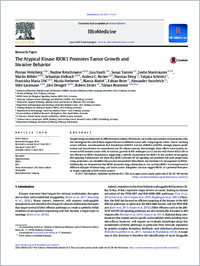The atypical kinase RIOK1 promotes tumor growth and invasive behavior
- Weinberg, Florian Institute of Molecular Medicine and Cell Research (IMMZ), Faculty of Medicine, Albert-Ludwigs-University (ALU), Freiburg, Germany - Faculty of Biology, ALU, Freiburg, Germany - BIOSS Centre for Biological Signalling Studies, BIOSS, ALU, Germany
- Reischmann, Nadine Institute of Molecular Medicine and Cell Research (IMMZ), Faculty of Medicine, Albert-Ludwigs-University (ALU), Freiburg, Germany - Faculty of Biology, ALU, Freiburg, Germany - Spemann Graduate School of Biology and Medicine (SGBM), ALU, Freiburg, Germany
- Fauth, Lisa Institute for Surgical Pathology, Medical Center and Faculty of Medicine, ALU, Germany
- Taromi, Sanaz Department of Hematology and Oncology, University Medical Center, ALU, Freiburg, Germany
- Mastroianni, Justin Faculty of Biology, ALU, Freiburg, Germany - Department of Hematology and Oncology, University Medical Center, ALU, Freiburg, Germany
- Köhler, Martin Institute of Molecular Medicine and Cell Research (IMMZ), Faculty of Medicine, Albert-Ludwigs-University (ALU), Freiburg, Germany - Faculty of Biology, ALU, Freiburg, Germany - Spemann Graduate School of Biology and Medicine (SGBM), ALU, Freiburg, Germany
- Halbach, Sebastian Institute of Molecular Medicine and Cell Research (IMMZ), Faculty of Medicine, Albert-Ludwigs-University (ALU), Freiburg, Germany - Faculty of Biology, ALU, Freiburg, Germany - Spemann Graduate School of Biology and Medicine (SGBM), ALU, Freiburg, Germany
- Becker, Andrea C. Freiburg Institute for Advanced Studies (FRIAS), ALU, Freiburg, Germany - Department of Dermatology, University Medical Center - ALU, Freiburg, Germany
- Deng, Niantao Garvan Institute of Medical Research, Darlinghurst, New South Wales, Australia - St Vincent's Clinical School, Faculty of Medicine, UNSW, Sydney, Australia
- Schmitz, Tatjana Institute of Molecular Medicine and Cell Research (IMMZ), Faculty of Medicine, Albert-Ludwigs-University (ALU), Freiburg, Germany
- Uhl, Franziska Maria Institute of Molecular Medicine and Cell Research (IMMZ), Faculty of Medicine, Albert-Ludwigs-University (ALU), Freiburg, Germany - Faculty of Biology, ALU, Freiburg, Germany - Department of Hematology and Oncology, University Medical Center, ALU, Freiburg, Germany
- Herbener, Nicola Institute for Surgical Pathology, Medical Center and Faculty of Medicine, ALU, Germany
- Riedel, Bianca Institute for Surgical Pathology, Medical Center and Faculty of Medicine, ALU, Germany
- Beier, Fabian Institute for Surgical Pathology, Medical Center and Faculty of Medicine, ALU, Germany
- Swarbrick, Alexander Garvan Institute of Medical Research, Darlinghurst, New South Wales, Australia - St Vincent's Clinical School, Faculty of Medicine, UNSW, Sydney, Australia
- Lassmann, Silke BIOSS Centre for Biological Signalling Studies, BIOSS, ALU, Germany - Institute for Surgical Pathology, Medical Center and Faculty of Medicine, ALU, Germany - German Cancer Consortium (DKTK, Freiburg) and German Cancer Research Center (DKFZ), Heidelberg, Germany
- Dengjel, Jörn BIOSS Centre for Biological Signalling Studies, BIOSS, ALU, Germany - Freiburg Institute for Advanced Studies (FRIAS), ALU, Freiburg, Germany - Department of Dermatology, University Medical Center - ALU, Freiburg, Germany - Department of Biology, University of Fribourg, Fribourg, Switzerland
- Zeiser, Robert BIOSS Centre for Biological Signalling Studies, BIOSS, ALU, Germany - Department of Hematology and Oncology, University Medical Center, ALU, Freiburg, Germany
- Brummer, Tilman Institute of Molecular Medicine and Cell Research (IMMZ), Faculty of Medicine, Albert-Ludwigs-University (ALU), Freiburg, Germany - Faculty of Biology, ALU, Freiburg, Germany - BIOSS Centre for Biological Signalling Studies, BIOSS, ALU, Germany
-
12.04.2017
Published in:
- EBioMedicine. - 2017, vol. 20, p. 79–97
English
Despite being overexpressed in different tumor entities, RIO kinases are hardly characterized in mammalian cells. We investigated the role of these atypical kinases in different cancer cells. Using isogenic colon-, breast- and lung cancer cell lines, we demonstrate that knockdown of RIOK1, but not of RIOK2 or RIOK3, strongly impairs proliferation and invasiveness in conventional and 3D culture systems. Interestingly, these effects were mainly observed in RAS mutant cancer cells. In contrast, growth of RAS wildtype Caco-2 and Bcr-Abl-driven K562 cells is not affected by RIOK1 knockdown, suggesting a specific requirement for RIOK1 in the context of oncogenic RAS signaling. Furthermore, we show that RIOK1 activates NF-κB signaling and promotes cell cycle progression. Using proteomics, we identified the pro-invasive proteins Metadherin and Stathmin1 to be regulated by RIOK1. Additionally, we demonstrate that RIOK1 promotes lung colonization in vivo and that RIOK1 is overexpressed in different subtypes of human lung- and breast cancer. Altogether, our data suggest RIOK1 as a potential therapeutic target, especially in RAS-driven cancers.
- Faculty
- Faculté des sciences et de médecine
- Department
- Département de Biologie
- Language
-
- English
- Classification
- Biological sciences
- License
-
License undefined
- Identifiers
-
- RERO DOC 305029
- DOI 10.1016/j.ebiom.2017.04.015
- Persistent URL
- https://folia.unifr.ch/unifr/documents/305932
Statistics
Document views: 135
File downloads:
- pdf: 235
